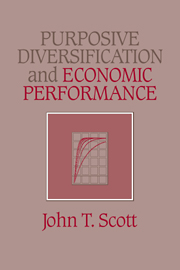Book contents
- Frontmatter
- Contents
- List of tables and figures
- Acknowledgements
- Introduction: An Overview
- Part I Static efficiency and the diversified firm
- Part II Firm and industry effects versus traditional models
- Part III Dynamic efficiency and the diversified firm
- Part IV Industrial policy
- Afterword: Perspectives through time and across countries
- Notes
- References
- Index
Introduction: An Overview
Published online by Cambridge University Press: 29 October 2009
- Frontmatter
- Contents
- List of tables and figures
- Acknowledgements
- Introduction: An Overview
- Part I Static efficiency and the diversified firm
- Part II Firm and industry effects versus traditional models
- Part III Dynamic efficiency and the diversified firm
- Part IV Industrial policy
- Afterword: Perspectives through time and across countries
- Notes
- References
- Index
Summary
In the autumn of 1980, having been granted a year-long leave of absence from Dartmouth College, I arrived in Washington, D.C., at the offices of the United States Federal Trade Commission Line of Business (FTC LB) Program. As a visiting research economist, I was granted access to the program's confidential data describing in unprecedented detail the diversification of the United States' largest manufacturing firms. After roughly a decade of working, first as an in-house economist and then as an outside consultant, with the FTC's remarkable data. I decided to bring together my observations about the FTC LB reporters' diversified activities. This book is the result. In the book, I introduce and apply methodology that discerns groups of manufacturing industries that are related because of complementarities in production, marketing, distribution, and research and development (R&D) activities. Manufacturing firms purposively diversify to exploit such complementarities, and I explore hypotheses about that behavior – i.e., purposive diversification – and ensuing economic performance. The book studies product diversification's effects on both static allocative efficiency and the optimality of R&D investment.
The study of those hypotheses about purposive diversification yields new perspectives on the policy debate about cooperation versus competition among firms. The debate is an old one that has flared anew. Chernow (1990, p. III) gives an interesting perspective on the debate at the beginning of the twentieth century when the firms involved were the railroads, the steelmakers, and the oil refiners.
Information
- Type
- Chapter
- Information
- Publisher: Cambridge University PressPrint publication year: 1993
